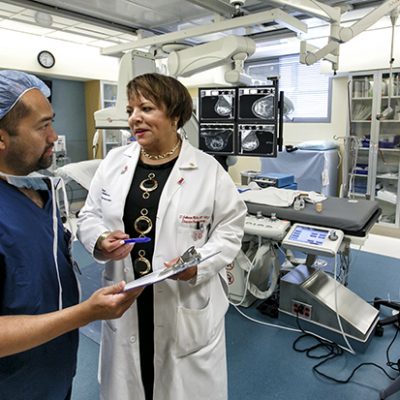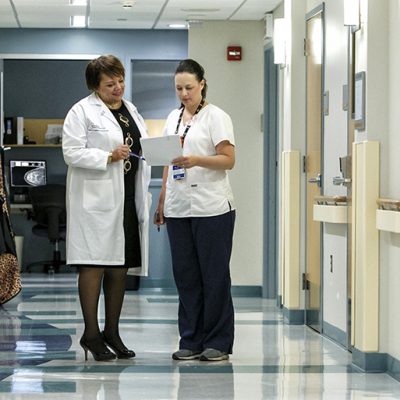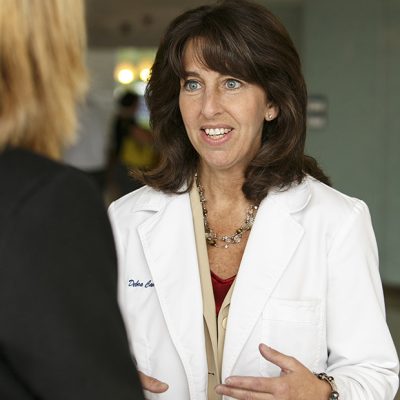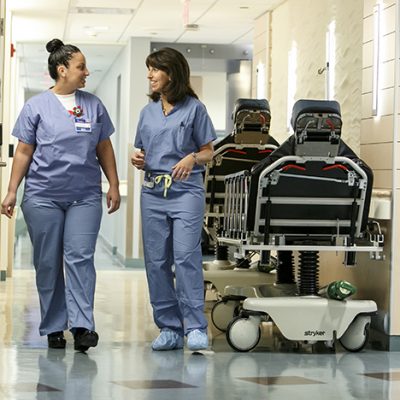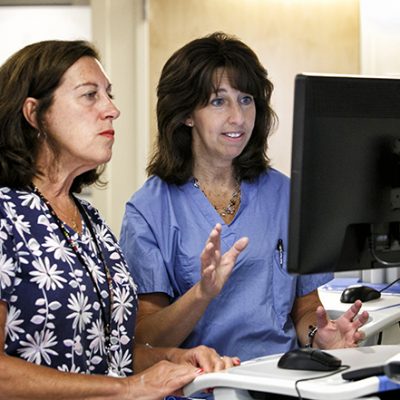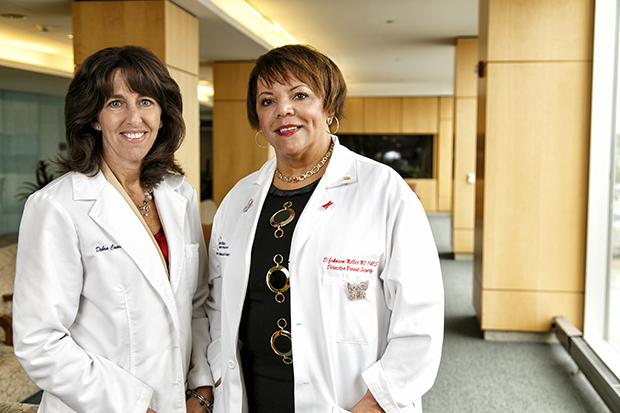
Meridian Health’s breast program is creating a uniform standard of care for patients battling cancer
By Jessica Jones-Gorman
Photos by Amessé Photography
As the nation’s breast cancer statistics continue to climb and a growing number of area residents are affected by the diagnosis, the Cancer Care team at Meridian Health is making great strides in combating the disease, unveiling new technologies that streamline breast cancer treatment and tackling the illness with a modern, multi-disciplinary approach.
“It is our goal to create a uniform standard of care for breast cancer patients across all five Meridian hospitals,” noted Dr. Debra Camal, medical director of the healthcare system’s breast program, which treats about 400 patients each year. “Breast cancer involves a lot of different specialties, so our program provides an entire team of people dedicated to making sure that every patient is offered the appropriate course of treatment. We put a lot of effort into maintaining that quality of care, and I think that’s what makes this entire system very unique.”
Dr. Camal, who has been in practice for 18 years, earned her medical degree from SUNY Downstate before completing residencies at Brown University and the University of Medicine and Dentistry of New Jersey. She maintained a practice in northern New Jersey for a number of years before becoming a part of the Meridian staff in 1997. In January 2012, Camal was named director of Meridian’s continually advancing breast program.
“As a surgeon, I was completely wrapped up in individual patient care,” she offered. “But now as medical director, I have the ability to look at the big picture and help make changes that will benefit every patient.”
Some of those benefits include some relatively simple solutions.
“When a patient is faced with a breast cancer diagnosis, a needle biopsy should be the first step,” Camal explained. “But that doesn’t always happen. Our goal is to make those biopsies available and prevent the offer of surgery as a first step.”
“One of the biggest initiatives we are continuing to improve upon is our multidisciplinary approach to battling this disease,” the doctor added. “We host weekly conferences during which all breast cancer cases are presented to a team of doctors before decisions about treatment are made. Options are then presented to the patient before a course of treatment begins. It’s tremendously helpful for both doctors and patients to get those opinions from all of the hospital’s specialties.”
A number of technological advances are also been recently introduced, such as Jersey Shore University Medican Center and Riverview Medical Center’s Faxitron system, which reduces breast biopsy and lumpectomy procedure times, and ultimately improves patient care.
“Faxitron allows real-time breast specimen imaging in the operating room so that the surgeon can determine if the resection is adequate and if additional margins need to be obtained,” noted Dr. Denise Johnson-Miller, medical director for breast surgery at Jersey Shore. “This reduces operative time while allowing the surgeon to remove additional margins at the time of the original surgery in order to avoid follow-up surgeries. Achieving negative margins with initial surgery is our primary goal in order to avoid delays in starting adjuvant radiation and chemotherapy.”
Dr. Johnson-Miller, who completed her undergraduate studies at Northwestern University and attended Washington University School of Medicine in St. Louis, completed a fellowship in surgical oncology at the City of Hope National Medical Center in California as well as residencies in general surgery from Jewish Hospital of St. Louis and the University of Illinois Affiliated Hospitals in Chicago. She served as associate professor at Stanford University School of Medicine and was medical director of breast surgery at St. Francis Health in Indianapolis. In 2011, she was named U.S. News and World Report’s Top 1 Percent Breast Surgery Physician and Indianapolis’s Top Doctor for Breast Surgery.
In 2013, she was recruited by Meridian to further improve the hospital system’s breast cancer program.
“It’s unfortunate, but the number of breast cancer cases here is extraordinary,” noted Johnson-Miller. “But this was a great opportunity for a busy hospital system to bring the utmost in care to local residents.”
And some of the first steps taken involved upgrading surgical equipment and technology. Both Jersey Shore and Ocean Medical Center now offer accelerated partial breast irradiation (APBI) for breast cancer treatment using the CONTURA Multi-Lumen Balloon Catheter. This unique method of radiation treatment involves the placement of a deflated balloon in the lumpectomy cavity, post-surgery, through a small incision. The balloon is then filled with saline and temporarily left in place for up to ten days during treatment. Radiation treatment is administered, traveling through the catheter, ensuring that only the tissue closest to the balloon is affected by radiation. At the end of the treatment, the balloon is deflated and gently removed.
“One of the most exciting advancements is the use of genomics—very personalized testing that helps identify and treat each individual tumor and gives prognostic information about the course of treatment that is required,” Johnson-Miller said. “This past year has been explosive in terms of advancements, and that Meridian has had the vision to make this type of care available to women in the central New Jersey area is phenomenal.”
And it’s also been Meridian’s goal to provide more outreach and understanding to women battling cancer.
“This area has a very diverse population and we have seen a number of BRCA1 and 2 [gene] mutations,” Johnson-Miller said. “We want to help those affected families…get them into screening before they come into the ER with advanced disease.”
Meridian Health, the only system partner with Rutgers Cancer Institute of New Jersey, is also increasing the number of clinical trials it performs, and its Meridian Cancer Care’s Patient Navigation Service, staffed by registered nurses, helps cancer patients and their families on their journey through treatment. Working with affiliated physicians, social workers, genetic counselors, clinical research associates, and dieticians, Nurse Navigators help coordinate all aspects of patient care.
“Too many present with advanced stage four or metastatic breast cancer,” said Johnson-Miller. “We’d like to see that number go down and with the right research, we’re confident that we can make that happen,” adding that Meridian’s breast program will only continue to expand.
“We are extremely excited about the growth of the breast cancer program at Meridian,” Dr. Camal concluded. “We’re adding physicians, nurse practitioners, and physician’s assistants to our staff, which will be wonderfully helpful for our patients. We want to streamline the entire treatment process—and something as simple as having a doctor in our mammography room, for example, is extremely helpful to our patients. We have a number of different plans in place to create this cohesive umbrella of care, which will truly deliver the best in treatment to our patient population.” •
Meridian Cancer Care Center
Ocean Medical Center
425 Jack Martin Blvd., Brick
732.840.2200 / meridiancancercarenj.com

